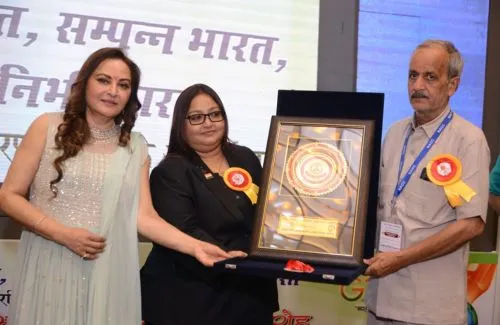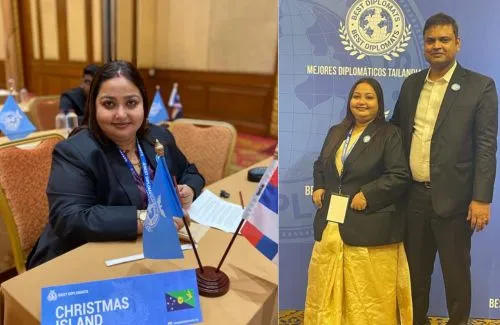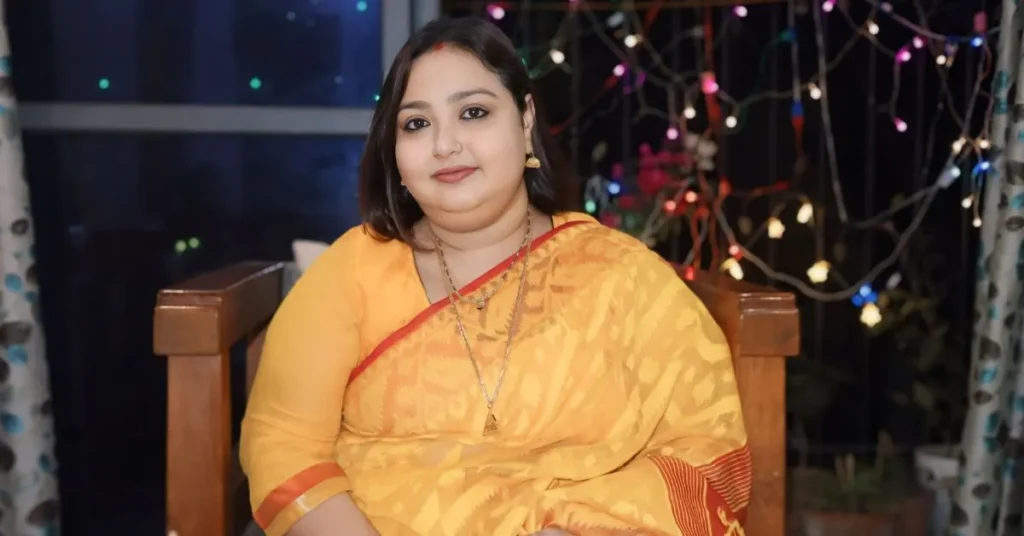From tender recollections of familial support to harrowing accounts of legal battles fought in the name of the oppressed, her narrative transcends mere discourse, resonating with a resounding call for societal change and empowerment. Embark on a transformative odyssey as Mita Banerjee shares her compelling narrative, illuminating the path towards a more just and equitable world.
Ria: Could you share a bit about your childhood experiences?
MB: My childhood was truly special. My father played a pivotal role in shaping who I am today; he wasn’t just a parent but also my closest confidant and cheerleader. His belief in me and constant support served as my guiding light. While other girls my age were often restricted from participating in student politics and attending meetings late into the night, my father allowed me and encouraged me to be the president of the student union at my college.
My mother, on the other hand, provided the necessary balance with her strict yet nurturing demeanor. Growing up in a joint family further enriched my childhood, filled with love and camaraderie. Overall, I look back on those years with fondness and gratitude.
Ria: Can you tell us about your academic journey?
MB: My academic years were truly memorable. While I may not have always topped the class, I had a special place in my teachers’ hearts. At Jogesh Chandra Choudhury College, I excelled in debate competitions, often emerging as the champion. I was known for spearheading seminars and discussions, earning the admiration of my professors. One of my proudest moments was being felicitated by our political science professor from Bengal Institute of Political Studies during my first visit to the UN, remains a highlight of my college years—it felt like a culmination of all my hard work and dedication.
It was also during this time that I met my husband and fell deeply in love.
Ria: What inspired your decision to become a lawyer?
MB: From a young age, I harbored a clear vision: either I would pursue a career in law or be an ideal homemaker. There was never any faltering from these aspirations. It’s as if the calling to become a lawyer was deeply ingrained within me, perhaps stemming from a past life where I may have been a lawyer with unfinished business. This belief drives my commitment to pro bono cases, as I strive to fulfill what I perceive as a karmic duty. I approach every case with dedication, never backing down until justice is served, regardless of the opposition.

Ria: Can you share some remarkable cases you have handled?
MB: One exemplary case that has profoundly impacted me involves a 9-year-old boy who was tragically abused by his own uncle. The family initially consulted several lawyers, but many provided misguided advice, compounding their distress. When they finally sought my counsel, the young child was deeply traumatized. He would ask his mother haunting questions, such as “What will happen to the case if I die?” or “What if you die, Maa?” The constant fear of not receiving justice had taken a grave toll on this innocent child.
However, one night, in a moment that will forever be etched in my memory, the boy’s mother called to share something that moved me to my core. She relayed that despite his tender age and the immense pain he had endured, her son had confided in her a resolute faith, stating, “Even if I die, Mita aunty toh ache” (Mita aunty will be there for me).
Ria: You’ve been deeply involved in social work throughout your life. Could you share how your journey began?
MB: It all started during my college days. I saw an elderly woman near Bhabani Cinema Hall, her eyes protruding and held in place with a band-aid. Seeing her distressing condition, I approached my father for assistance. Together, we arranged for her to receive medical treatment, with my father providing ₹80,000 for her care. This incident profoundly impacted me, igniting a passion to make a difference in society.
My father’s words always resonated with me—the importance of being present for someone’s funeral, even if unable to attend any wedding party. This philosophy guided my actions. When Gini Mashi, a destitute woman from our neighborhood, passed away, many hesitated to offer her a dignified farewell due to her status as a beggar. Despite this, I, along with a few others, took it upon us to ensure she received proper last rites.
Also Read: Stories of Motherhood: Moubani Sorcar and Joysri Devi
I harbor a deep desire to continue this service. If circumstances permit, I aspire to perform the last rites of unclaimed bodies and advocate in the high court for the provision of proper funerals for all unclaimed deceased, ensuring their souls attain sadgati.
I always feel fortunate for the opportunities to serve society. Whether it’s in Chandameta, Chattisgarh, where I raise awareness about laws and provide assistance during water scarcity, or elsewhere, the gratitude expressed by those I help fills me with a sense of fulfillment and peace.
Ria: If you could change anything in society, what would it be?
MB: If given the opportunity, I would reintroduce legal studies into the educational curriculum. Basic legal knowledge should be accessible to every citizen. I firmly believe that knowledge, power, and courage are integral to combating corruption, and these qualities stem from an understanding of the law. Empowering every individual with basic legal literacy not only benefits them personally but also contributes to the effectiveness of our judicial system.

Ria: Can you share a specific case that highlights the vulnerability faced by women?
MB: In 2020, there was a distressing rape case in Kasba. The victim, who had connected with the perpetrator through social media, was lured into meeting him, where he drugged and assaulted her. The local police station and lower judiciary displayed reluctance in pursuing the case, pressuring the victim’s mother to withdraw her complaint. Recognizing the gravity of the situation, particularly with the victim studying abroad, I sought intervention from the high court, facilitating a hearing through the embassy. Despite facing attempts at bribery from the accused, we persevered, eventually securing his imprisonment for a period of time.
This case sheds light on the harsh realities of gender bias within our judicial system. Women often face societal judgment and prejudice, compounded by stereotypes and victim-blaming attitudes. Although both male and female prostitution exist, it’s unfortunate that the language surrounding female prostitution is rife with derogatory synonyms, often used as insults or as swear words. Even in the aftermath of such heinous crimes like rape, women are unfairly scrutinized and held accountable, perpetuating harmful narratives that undermine their rights and dignity.
Ria: How do you perceive the changes in society over time?
MB: Undoubtedly, there has been progress, with more women gaining access to education and increasing societal awareness. However, women still contend with various forms of abuse in their daily lives. It’s not always physical; verbal abuse is prevalent too. Women often endure demeaning remarks, especially in their in-laws’ homes, reinforcing the notion that they don’t truly belong there. This verbal mistreatment is equally damaging.
Conversely, men also face challenges, such as pressure to fulfill materialistic demands from their partners. Some women expect extravagant gifts simply because others possess them, oblivious to the financial strain it places on their husbands. I often emphasize that society operates in shades of grey rather than absolutes of black and white. Despite these complexities, returning home each night from navigating this grey area signifies a victory in itself.



